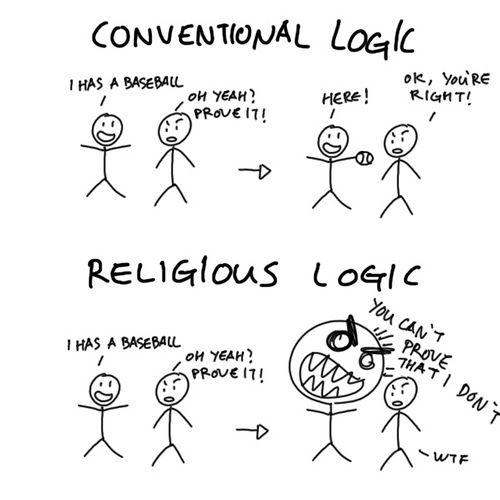
Who has the burden of proof?
Whoever is trying to prove something. If a theist is making the argument that God exists, they have to prove it. If an atheist is making the argument that God does not exist, then they have to prove it.
Any reasonable person, atheist or theist, must be agnostic when it comes to God's existence. If they are not then they are not reasonable.
I don't believe that God exists, but I would never argue that he is,indeed, nonexistent. I have no proof of this, so it would be ludicrous for me to presume to know any more than the theist I am arguing with.
This doesn't mean that I would not argue in support of my reasoning for not believing in God. I would even try to influence people to believe the same thing as me, but I would never claim to be proving anything.
3 comments:
Justin,
Good point! This got me wondering. What if God were framed in certain ways? Would the above still hold? Saying "It's impossible that God exists" indeed seems foolish. What if you change the premise around? Could one more successfully argue FOR a non-omnipotent God? Or could one more successfully argue AGAINST a non-benevolent God? Just wondering / babbling.
Hi Mark,
I'm not sure I take your meaning. In my opinion, trying to prove either of those "framed" gods is equally futile; there is no proof.
I assume that you are thinking about the paradox that God cannot be all good and all powerful if evil exists.
In terms of believing in (not proving) one of those gods, I am not sure which one would be more appealing to me. On the one hand I appreciate the all good god's empathy with our human situation, but I resent its inability to help us.
On the other hand, I would be in awe of an all powerful god, but disillusioned by its lack of concern for our condition.
You weren't in my freshman precept, were you? We read "Why Bad Things Happen to Good People" by Harold Kushner, a rabbi whose son has progeria (the disease the Robin Williams had in Jack, but much worse than depicted). He questions God and concludes that God is the non-omnipotent type, having given us free will and presumably allowing evolution to happen(?).
This always seemed like a cop out to me, but then again I am of the atheistic persuasion.
Let me guess. You had rich college friends who could afford to party their college years away, and get an easy, useless degree (any Liberal Arts Degree that doesn't lead to Law School). You followed them in this lifestyle, but the problem is your parents weren't rich. Having a useless degree, and no real skills, you took a teaching job in a subject you don't truly understand as an alternative to unemployment. Your reasoning sounds so sophomoric that usually an expert wouldn't comment. You have a very long way to go in your understanding of religion, physics, or philosophical reasoning. Go back and learn some more, but this time don't play the college fool, pay attention in class, and don't cheat on tests.
Post a Comment